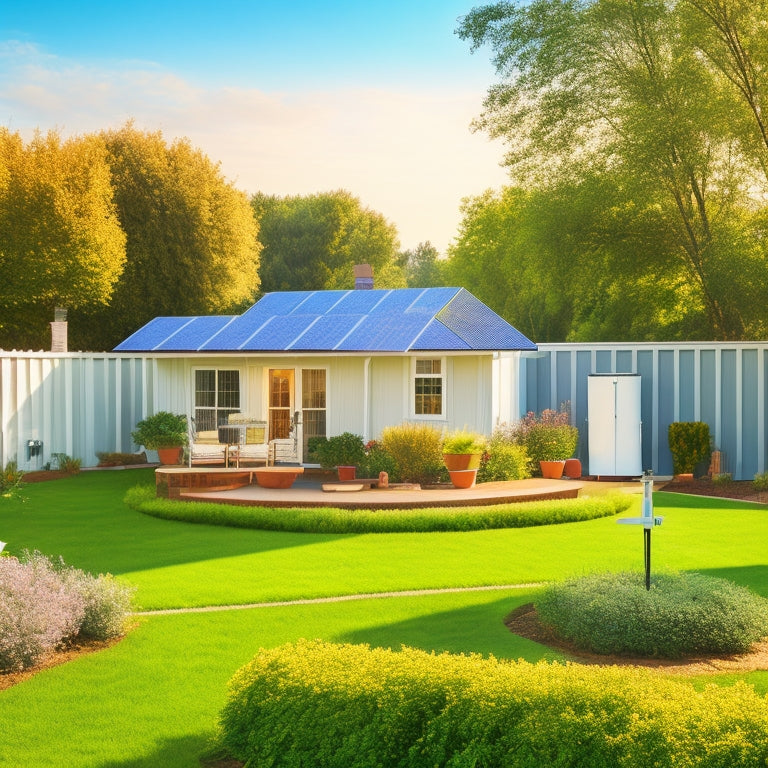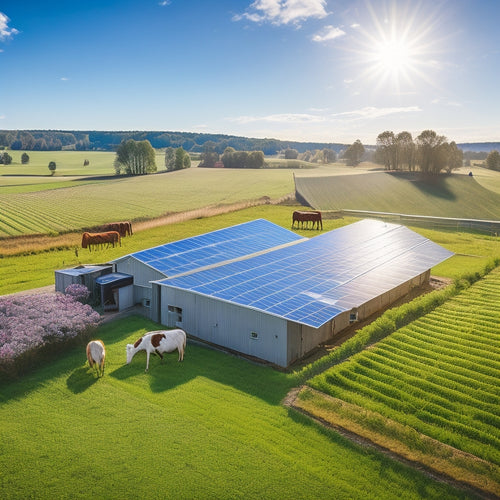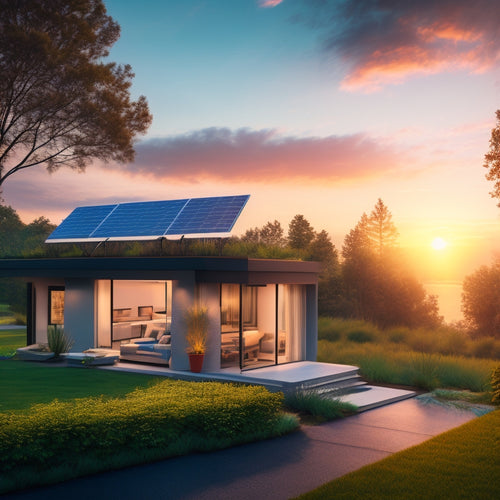
Gain Energy Independence at Home Easily
Share
By embracing renewable energy and enhancing your home's power usage, you can easily gain energy independence. Start by evaluating your current energy consumption patterns, reviewing appliance efficiency, and examining past utility bills to create an energy profile. Then, choose high-efficiency solar panels and consider integrating a battery storage system to maximize energy output and reduce reliance on the grid. Proper installation, maintenance, and monitoring are essential to guarantee peak performance. As you take these steps, you'll be well on your way to achieving energy independence and reducing your utility bills and carbon footprint, and there's more to investigate to fully reveal the benefits of renewable resources.
Key Takeaways
- Assess your energy needs by evaluating current consumption patterns, appliance efficiency, and past utility bills to determine the right solar panel system.
- Choose high-efficiency solar panels with durable warranties, balancing upfront costs with long-term energy savings and ROI.
- Ensure optimal installation by hiring professionals, evaluating roof size and orientation, and addressing shading issues.
- Maximize energy output by monitoring system performance, identifying areas for improvement, and considering upgrades and optimization software.
- Achieve energy independence by integrating a suitable battery storage system, tracking energy production and consumption, and optimizing energy usage.
Assessing Your Energy Needs
As you begin the expedition to energy independence at home, an important first step is to accurately assess your energy needs. This involves evaluating your current energy consumption patterns to determine how much energy you require to power your home.
Conduct an efficiency evaluation of your appliances, lighting, and HVAC systems to identify areas of high energy usage. Review your past utility bills to analyze your energy consumption over time.
To get an accurate representation of your energy needs, create an energy profile listing device power ratings and daily usage hours. Consider device efficiency and potential system losses in calculations.
Choosing the Right Solar Panels
With your energy needs accurately assessed, you're now ready to select the right solar panels to meet those needs. This is a vital step in achieving energy independence, as the type and quality of solar panels you choose will directly impact your system's performance and efficiency.
When choosing solar panels, consider the following key factors:
-
Solar panel types: Monocrystalline, polycrystalline, and thin-film panels each have their pros and cons, including varying efficiency ratings and durability. For instance, Renogy is known for its monocrystalline panels with high efficiency rates, making them a popular choice among homeowners.
-
Efficiency ratings: Look for high-efficiency panels to maximize energy production per unit area. Proper sizing and panel orientation are essential for maximizing energy production efficiency, regardless of the system type.
-
Durability and warranty: Assess the panel's build quality, weather resistance, and warranty offered by the manufacturer.
- Budget and ROI: Balance upfront costs with long-term energy savings and potential returns on investment.
Installation and Maintenance Tips
Proper installation and regular maintenance are vital to guaranteeing your solar panel system operates at peak performance and lasts for its expected lifespan.
When it comes to solar panel installation, consider hiring a licensed and experienced professional to make sure the job is done correctly. They'll assess your roof's size, orientation, and shading to determine the best placement for your panels.
To maximize energy output, it's imperative to evaluate solar panels with efficiency ratings above 20% and durable constructions for environmental resilience.
For routine maintenance, inspect your system regularly to identify any issues early on. Check for debris, dirt, or signs of wear and tear on the panels and inverters. Clean your panels periodically to maintain their efficiency.
Maximizing Energy Output Potential
Enhancing your solar panel system's energy output potential requires careful consideration of several key factors.
To maximize energy production, you need to verify your system is running at peak performance.
Here are some key considerations:
-
Panel Orientation: Confirm your panels are installed at the ideal angle and direction to capture the most sunlight.
-
Shading Analysis: Identify and address any shading issues that may be reducing your system's energy output.
-
Performance Monitoring: Regularly monitor your system's performance to detect any issues or areas for improvement.
- System Upgrades: Consider upgrading your system with more efficient components or adding features like energy optimization software to enhance solar efficiency.
Integrating Battery Storage Systems
Integrating a battery storage system into your solar panel setup can greatly enhance your energy independence by storing excess energy generated during the day for use during the night or on cloudy days.
You'll have a backup power source when the grid goes down, and you can even sell excess energy back to the grid.
There are various battery types to choose from, including lead-acid, lithium-ion, and saltwater batteries, each with its pros and cons.
When selecting a battery, consider factors like depth of discharge, round-trip efficiency, and lifespan.
The cost benefits of integrating a battery storage system can be substantial, as you'll reduce your reliance on the grid and lower your energy bills.
Monitoring Your Energy Independence
As you've taken steps to integrate a battery storage system into your solar panel setup, you're now generating and storing your own clean energy.
Now, it's essential to monitor your energy independence to optimize your energy consumption and maximize the benefits of your renewable resources.
To do this, you'll want to track key metrics, including:
- Your energy production and consumption patterns
- The capacity and health of your battery storage system
- The amount of energy you're exporting to or importing from the grid
- Your overall energy independence percentage
Frequently Asked Questions
Can I Install Solar Panels on a Rented Property?
You'll need to contemplate your rental agreement and landlord's permission before installing solar panels on a rented property, as modifications may be restricted; additionally, you'll want to weigh the costs and benefits of solar panel installation against your expected tenure.
Are Energy-Independent Homes More Valuable?
As you consider selling, you'll find it's no coincidence that energy-independent homes enhance property value; in fact, studies show that energy efficiency upgrades can increase your home's worth by up to 17%, making it a smart investment.
Do Solar Panels Work During Power Outages?
You might wonder if solar panels continue functioning during power outages; the answer is, they typically don't, unless you have a battery backup system, which allows you to store excess energy and use it during power outage solutions.
Can I Use Solar Energy for My Electric Vehicle?
You can utilize solar energy to fuel your electric vehicle, leveraging solar charging to reduce your carbon footprint and reap EV benefits like lower operating costs and a cleaner conscience, all while driving sustainably.
Are There Government Incentives for Energy Independence?
You'll be pleased to know that, yes, government incentives exist for energy independence, offering tax credits for homeowners who invest in renewable energy systems, making it more affordable for you to utilize clean energy and reduce your reliance on the grid.
Related Posts
-

What Do I Need to Know About Farm Solar Panels
When considering farm solar panels, you need to assess costs, benefits, and technical specifics. Initial investment c...
-

Key Components of a Reliable Emergency Power Supply System
A reliable emergency power supply system requires several key components. You need proven performance metrics to guar...
-

The Future of Residential Energy Storage
The future of residential energy storage looks promising and cost-effective for you. With lithium-ion battery prices ...


